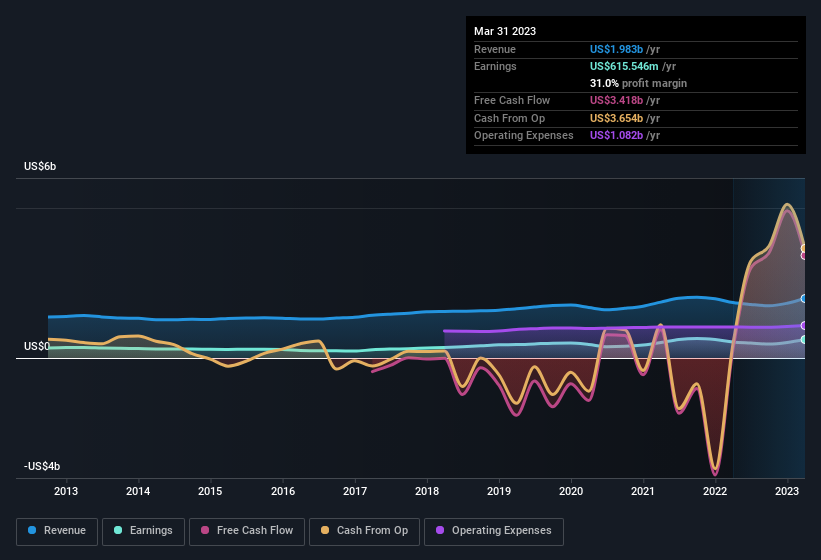- United States
- /
- Banks
- /
- NasdaqGS:BOKF
If EPS Growth Is Important To You, BOK Financial (NASDAQ:BOKF) Presents An Opportunity

For beginners, it can seem like a good idea (and an exciting prospect) to buy a company that tells a good story to investors, even if it currently lacks a track record of revenue and profit. But the reality is that when a company loses money each year, for long enough, its investors will usually take their share of those losses. While a well funded company may sustain losses for years, it will need to generate a profit eventually, or else investors will move on and the company will wither away.
If this kind of company isn't your style, you like companies that generate revenue, and even earn profits, then you may well be interested in BOK Financial (NASDAQ:BOKF). While profit isn't the sole metric that should be considered when investing, it's worth recognising businesses that can consistently produce it.
See our latest analysis for BOK Financial
BOK Financial's Earnings Per Share Are Growing
If a company can keep growing earnings per share (EPS) long enough, its share price should eventually follow. That means EPS growth is considered a real positive by most successful long-term investors. BOK Financial managed to grow EPS by 13% per year, over three years. That's a good rate of growth, if it can be sustained.
Top-line growth is a great indicator that growth is sustainable, and combined with a high earnings before interest and taxation (EBIT) margin, it's a great way for a company to maintain a competitive advantage in the market. It's noted that BOK Financial's revenue from operations was lower than its revenue in the last twelve months, so that could distort our analysis of its margins. EBIT margins for BOK Financial remained fairly unchanged over the last year, however the company should be pleased to report its revenue growth for the period of 7.3% to US$2.0b. That's encouraging news for the company!
The chart below shows how the company's bottom and top lines have progressed over time. To see the actual numbers, click on the chart.

You don't drive with your eyes on the rear-view mirror, so you might be more interested in this free report showing analyst forecasts for BOK Financial's future profits.
Are BOK Financial Insiders Aligned With All Shareholders?
Theory would suggest that it's an encouraging sign to see high insider ownership of a company, since it ties company performance directly to the financial success of its management. So those who are interested in BOK Financial will be delighted to know that insiders have shown their belief, holding a large proportion of the company's shares. To be exact, company insiders hold 58% of the company, so their decisions have a significant impact on their investments. This should be seen as a good thing, as it means insiders have a personal interest in delivering the best outcomes for shareholders. And their holding is extremely valuable at the current share price, totalling US$3.1b. That level of investment from insiders is nothing to sneeze at.
While it's always good to see some strong conviction in the company from insiders through heavy investment, it's also important for shareholders to ask if management compensation policies are reasonable. A brief analysis of the CEO compensation suggests they are. For companies with market capitalisations between US$4.0b and US$12b, like BOK Financial, the median CEO pay is around US$8.2m.
The BOK Financial CEO received total compensation of just US$3.4m in the year to December 2022. That looks like a modest pay packet, and may hint at a certain respect for the interests of shareholders. CEO compensation is hardly the most important aspect of a company to consider, but when it's reasonable, that gives a little more confidence that leadership are looking out for shareholder interests. Generally, arguments can be made that reasonable pay levels attest to good decision-making.
Should You Add BOK Financial To Your Watchlist?
One positive for BOK Financial is that it is growing EPS. That's nice to see. The growth of EPS may be the eye-catching headline for BOK Financial, but there's more to bring joy for shareholders. With a meaningful level of insider ownership, and reasonable CEO pay, a reasonable mind might conclude that this is one stock worth watching. What about risks? Every company has them, and we've spotted 1 warning sign for BOK Financial you should know about.
Although BOK Financial certainly looks good, it may appeal to more investors if insiders were buying up shares. If you like to see insider buying, then this free list of growing companies that insiders are buying, could be exactly what you're looking for.
Please note the insider transactions discussed in this article refer to reportable transactions in the relevant jurisdiction.
Valuation is complex, but we're here to simplify it.
Discover if BOK Financial might be undervalued or overvalued with our detailed analysis, featuring fair value estimates, potential risks, dividends, insider trades, and its financial condition.
Access Free AnalysisHave feedback on this article? Concerned about the content? Get in touch with us directly. Alternatively, email editorial-team (at) simplywallst.com.
This article by Simply Wall St is general in nature. We provide commentary based on historical data and analyst forecasts only using an unbiased methodology and our articles are not intended to be financial advice. It does not constitute a recommendation to buy or sell any stock, and does not take account of your objectives, or your financial situation. We aim to bring you long-term focused analysis driven by fundamental data. Note that our analysis may not factor in the latest price-sensitive company announcements or qualitative material. Simply Wall St has no position in any stocks mentioned.
About NasdaqGS:BOKF
BOK Financial
Operates as the financial holding company for BOKF, NA that provides various financial products and services in Oklahoma, Texas, New Mexico, Northwest Arkansas, Colorado, Arizona, and Kansas/Missouri.
Flawless balance sheet established dividend payer.


